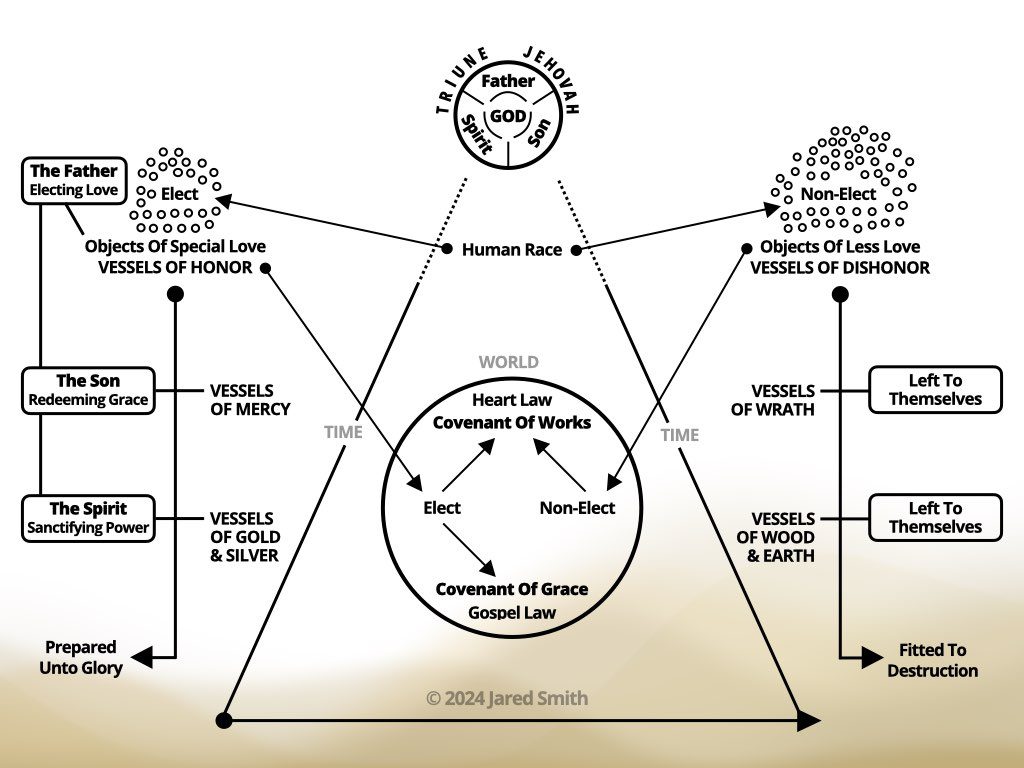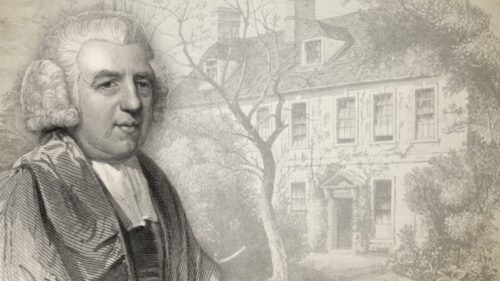Behold The Potter And The Clay
The Apostle Paul instructed the believers at Colosse to teach and admonish one another in psalms, hymns and spiritual songs. That is what I hope to do by explaining the meaning of this hymn, against the backdrop of the Framework of Sovereign Grace.
[An automated transcript of the teaching video]
The Apostle Paul encouraged the churches in Colosse to instruct, teach and admonish one another in psalms, hymns and spiritual songs. That’s what I hope to do by explaining the meaning of this hymn—Behold The Potter And The Clay. I’ll explain the meaning of the hymn against the backdrop of the Framework of Sovereign Grace, which is God’s master plan for the ages.

You see the hymn was written by Isaac Watts. Isaac Watts was an 18th century sovereign grace Congregational preacher, and he is known also as the father of Hymnody.
Now, I’d like to read for you the stanzas of this hymn. There are eight in total:
1 Behold the Potter and the clay;
He forms His vessels as He please:
Such is our God, and such are we,
The subjects of His high decrees.
2 Doth not the workman’s power extend,
O’er all the mass which part to choose,
And mould it for a nobler end,
And which to leave for viler use?
3 May not the sovereign Lord on high,
Dispense His favors as He will?
Choose some to life, while others die,
And yet be just and gracious still?
4 What if, to make His terror known,
He lets His patience long endure,
Suffering vile rebels to go on,
And seal their own destruction sure?
5 What if He mean to show His grace,
And His electing love employs,
To mark out some of mortal race,
And form them fit for heavenly joys?
6 Shall man reply against His Lord,
And call His Maker’s ways unjust,
The thunder of Whose dreadful word,
Can crush a thousand worlds to dust?
7 But, O my soul, if truths so bright,
Should dazzle and confound thy sight,
Yet still His written will obey,
And wait the great decisive day.
8 Then shall He make His justice known,
And the whole world before His throne,
With joy or terror, shall confess,
The glory of His righteousness.
This hymn is actually based on the words of the Apostle Paul recorded in Romans chapter nine, verses 21 through 23—“Hath not the potter power over the clay, of the same lump to make one vessel unto honor and another unto dishonor? What if God, willing to show his wrath and to make his power known, endured with much longsuffering the vessels of wrath fitted to destruction; and that he might make known the riches of his glory on the vessels of mercy, which he had afore prepared unto glory.”
In fact, the Framework of Sovereign Grace is also based on that text of Scripture. God is depicted as the potter; the human race, as the clay; God the Father has chosen some vessels unto honor, while setting aside the others unto dishonor. Having then determined to bring both groups of people into a time continuum and into the world, under the headship of Adam and a covenant of works; and therefore through Adam’s sin, both the elect and non-elect would be plunged in sin; the Father then chose to leave the vessels unto dishonor to themselves, making them vessels of wrath and vessels of wooden earth, fitting them to destruction.
However, since the Father already set His electing love upon the vessels unto honor, He devised a plan to save them from their sins. First, He gave this people to His Son, that in the person of the Lord Jesus Christ, they might be redeemed and justified, thereby making them vessels of mercy. And second, He gave this people to His Spirit, thereby sanctifying them, or regenerating their souls, and making them vessels of gold and silver. And it is in this way, my dear friends, the Father has prepared His people unto glory.
Now this is what I have come to call the Framework of Sovereign Grace, which is God’s master plan for the ages. And this is the subject of the hymn before us.
Stanza 1
“Behold the Potter and the clay;
He forms His vessels as He please:
Such is our God, and such are we,
The subjects of His high decrees.”
Stanza 2
“Doth not the workman’s power extend,
O’er all the mass which part to choose,
And mould it for a nobler end,
And which to leave for viler use?”
Stanza 3
“May not the sovereign Lord on high,
Dispense His favors as He will?
Choose some to life, while others die,
And yet be just and gracious still?”
Stanza 4
“What if, to make His terror known,
He lets His patience long endure,
Suffering vile rebels to go on,
And seal their own destruction sure?”
Stanza 5
“What if He mean to show His grace,
And His electing love employs,
To mark out some of mortal race,
And form them fit for heavenly joys?”
Stanza 6
“Shall man reply against His Lord,
And call His Maker’s ways unjust,
The thunder of Whose dreadful word,
Can crush a thousand worlds to dust?”
Stanza 7
“But, O my soul, if truths so bright,
Should dazzle and confound thy sight,
Yet still His written will obey,
And wait the great decisive day.”
Stanza 8
“Then shall He make His justice known,
And the whole world before His throne,
With joy or terror, shall confess,
The glory of His righteousness.”
Either by His justice on condemning to hell the rebels, or by His grace saving through Christ His elect people.
That, my dear friends, is Isaac Watts’ hymn on Paul’s teachings in Romans chapter nine. And as you see, it fully accords with the Framework of Sovereign Grace, or, God’s master plan for the ages. I now ask you, where do you fit into God’s master plan for the ages? Do you know your sins forgiven through the person and work of the Lord Jesus Christ? Does the Spirit of God bear witness with your spirit that you’re one of His children? Then rejoice, for you know yourself to be chosen of God and numbered among His elect! And now I say, make your calling an election sure. Work out your own salvation with fear and trembling. For it is God who works within you both to will and to do of His good pleasure.
And for those of you who may be watching this and do not have the witness of the Spirit upon your soul; you do not know your sins forgiven; you do not know whether you are elect of God, or rejected by God—I say to you, just because you have not yet experienced the new birth does not mean by necessity or default you therefore belong to the non-elect. Oh no, for listen, all of us who are God’s elect people come into this world in an unregenerate condition, which means there is a point in all of our lives when we are living in darkness experientially, separated from a saving knowledge of Christ, so that we at one time were like you. Oh, may it please God in His providence, that if He has brought you to this teaching video, to this hymn devotion, that He is gracious to now bestow upon you that saving grace experientially, uniting your soul with Christ, granting you the experience of a new birth. That you might join now with me, with us, knowing your sins forgiven, that your name is recorded in the lamb’s book of life.
And now, you with me, with us, may sing together, to the edification of our souls and the glory of God, the words of this hymn.
Jared Smith served twenty years as pastor of a Strict and Particular Baptist church in Kensington (London, England). He now serves as an Evangelist in the Philippines, preaching the gospel, organizing churches and training gospel preachers.
Jared Smith's Online Worship Services
Jared Smith's Sermons
Jared Smith on the Gospel Message
Jared Smith on the Biblical Covenants
Jared Smith on 18th Century Covenant Theology (Hyper-Calvinism)
Jared Smith on the Gospel Law
Jared Smith on Bible Doctrine
Jared Smith on Bible Reading
Jared Smith's Hymn Studies
Jared Smith on Eldership
Jared Smith's Studies In Genesis
Jared Smith's Studies in Romans
Jared Smith on Various Issues
Jared Smith, Covenant Baptist Church, Philippines
Jared Smith's Maternal Ancestry (Complete)





